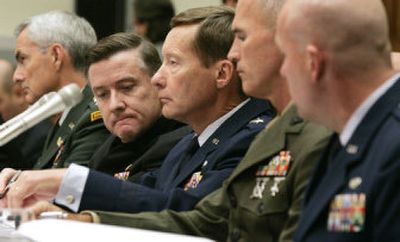Detainee trial rules hit

WASHINGTON – President Bush’s campaign to sharply limit the courtroom rights of suspected terrorists ran into opposition Thursday from key Republican senators and even top uniformed military lawyers, who said it would violate basic principles of justice.
The military lawyers told a House panel that they particularly object to Bush’s bid to allow terrorism suspects to be convicted on secret evidence that is withheld from the defendants, an objection embraced by at least three prominent members of the Senate Armed Services Committee.
One of those is John McCain, R-Ariz., a former Vietnam War prisoner and a 2008 presidential hopeful who faces a political dilemma. Several colleagues cautioned McCain and the others to stick with Bush on the tribunals question, and House leaders scheduled a vote in two weeks on legislation likely to mirror the White House’s proposal.
The day’s events suggest that Republicans may spend a good portion of the 109th Congress’ final weeks trying to resolve an issue that could factor heavily in the Nov. 7 elections. Earlier divisions among Senate Republicans on issues such as immigration have contributed to legislative stalemates, and party leaders are eager to avoid a similar impasse over detainee trials.
Bush placed the issue near the top of the political agenda Wednesday when he announced that several top al-Qaida suspects have been moved from secret CIA-run prisons to the U.S. military base at Guantanamo Bay, Cuba. The president suggested that Congress will be to blame if it fails to approve his proposals for prosecuting the detainees under guidelines that critics say are unconstitutional and unfair.
Lawmakers in both parties agree that enemy combatants should be afforded fewer rights than defendants enjoy in civil trials or, for the most part, in military courts-martial. But several uniformed military lawyers told the House Armed Services Committee Thursday that the White House goes too far in seeking to convict detainees on classified information never shared with the suspects.
“I am not aware of any situation in the world where there is a system of jurisprudence that is recognized by civilized people where an individual can be tried and convicted without seeing the evidence against him,” said Brig. Gen. James Walker, staff judge advocate to the Marine Corps commandant.
Bush’s high-profile drive for his version of the legislation has been particularly awkward for the three Republican senators who circulated a different bill earlier this week: McCain; Armed Services Committee Chairman John Warner, R-Va.; and Lindsey Graham, R-S.C.
But virtually all Senate Democrats, and at least a few more Republicans, appear sympathetic to Warner, McCain and Graham. Sen. Chuck Hagel, R-Neb., said in an interview that he takes very seriously the testimony of the uniformed lawyers. He also said Bush was “unwise” to come close to threatening Congress in his Wednesday speech. “We don’t work for the president,” Hagel said.
Under Bush’s proposal, any detainees eventually put forward for trial – a group that may or may not include all 14 suspects that figured in Bush’s Wednesday announcement – could be convicted or acquitted under conditions that differ sharply from standard U.S. criminal trials.
Those eligible for such military trials would be any foreigners deemed “unlawful enemy combatants,” a term the administration defines more broadly than Bush did in an executive order shortly after the 2001 terrorist attacks. That category would include not just al-Qaida and Taliban members, but anyone affiliated with a “force or organization” engaged in hostilities against the United States and its allies, who commits hostile acts for such groups, or – most broadly – who “supports hostilities” that aid such groups.
During the trials, prosecutors would be permitted to use classified information to secure convictions, which the defendants and their lawyers would not be told about. The prosecutors could also rely on hearsay, or evidence obtained indirectly, and evidence obtained by coercion if the panel’s chief deems it reliable and directly related to the accusations.
A rival set of rules circulated earlier this week by Warner, McCain and Graham would bar any use in the trials of secret evidence or information obtained from “cruel, inhuman, or degrading treatment” and admit information from coercive interrogations only if the military judge finds it reliable and pertinent. It would allow trials to be closed only to protect information that would damage national security.